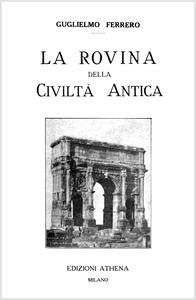La rovina della civiltà antica by Guglielmo Ferrero
"La rovina della civiltà antica" by Guglielmo Ferrero is a historical account written in the early 20th century. The work delves into the decline of ancient civilization, examining significant episodes and systemic failures that contributed to its downfall. Ferrero reflects on both the historical context and the implications of this decline for contemporary society, suggesting that lessons learned from the past are still relevant in identifying threats to modern civilization. The opening
of this account establishes Ferrero's intent to explore the causes behind the decline of ancient civilizations, particularly focusing on the Roman Empire's transformation from a powerful society to one riddled with internal strife and external invasions. He begins by contradicting the notion that the decline was gradual, positing instead that it culminated dramatically after a brief period of robust cultural and political existence. Through insights into the structure of imperial authority, Ferrero critiques the political chaos following the assassination of Emperor Alexander Severus and discusses how disintegrating aristocracy, the erosion of civic virtue, and the rise of competing powers weakened the Empire’s foundation, ultimately contributing to its disintegration. (This is an automatically generated summary.)
Read or download for free
| How to read | Url | Size | |||
|---|---|---|---|---|---|
| Read now! | https://www.gutenberg.org/ebooks/71390.html.images | 251 kB | |||
| EPUB3 (E-readers incl. Send-to-Kindle) | https://www.gutenberg.org/ebooks/71390.epub3.images | 281 kB | |||
| EPUB (older E-readers) | https://www.gutenberg.org/ebooks/71390.epub.images | 278 kB | |||
| EPUB (no images, older E-readers) | https://www.gutenberg.org/ebooks/71390.epub.noimages | 164 kB | |||
| Kindle | https://www.gutenberg.org/ebooks/71390.kf8.images | 350 kB | |||
| older Kindles | https://www.gutenberg.org/ebooks/71390.kindle.images | 329 kB | |||
| Plain Text UTF-8 | https://www.gutenberg.org/ebooks/71390.txt.utf-8 | 226 kB | |||
| Download HTML (zip) | https://www.gutenberg.org/cache/epub/71390/pg71390-h.zip | 248 kB | |||
| There may be more files related to this item. | |||||
Similar Books
About this eBook
| Author | Ferrero, Guglielmo, 1871-1942 |
|---|---|
| Translator | Ferrero, Leo, 1903-1933 |
| Uniform Title | La ruine de la civilisation antique. Italian |
| Title | La rovina della civiltà antica |
| Original Publication | Milano: Athena, 1926. |
| Note | Reading ease score: 25.6 (College graduate level). Very difficult to read. |
| Note | Originally published in French as articles in the "Revue des deux mondes" in 1919-1920. Translated into Italian by G. Ferrero's son, Leo, in 1925. |
| Credits | Barbara Magni and the Online Distributed Proofreading Team at http://www.pgdp.net (This file was produced from images made available by the HathiTrust Digital Library) |
| Language | Italian |
| LoC Class | DG: History: General and Eastern Hemisphere: Italy, Vatican City, Malta |
| Subject | Rome -- Civilization |
| Subject | Rome -- History -- Empire, 30 B.C.-476 A.D. |
| Subject | Church history -- Primitive and early church, ca. 30-600 |
| Category | Text |
| EBook-No. | 71390 |
| Release Date | Aug 11, 2023 |
| Copyright Status | Public domain in the USA. |
| Downloads | 173 downloads in the last 30 days. |
| Project Gutenberg eBooks are always free! | |

